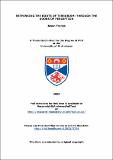Files in this item
Rethinking the roots of terrorism: through the doors of perception
Item metadata
| dc.contributor.author | Franks, Jason | |
| dc.coverage.spatial | 347 | en_US |
| dc.date.accessioned | 2013-06-19T11:02:44Z | |
| dc.date.available | 2013-06-19T11:02:44Z | |
| dc.date.issued | 2005 | |
| dc.identifier.uri | https://hdl.handle.net/10023/3726 | |
| dc.description.abstract | This study examines the new terrorism debate and is intended to rethink the root causes of terrorism by examining alternative approaches, in part provided by conflict theory, to the predominant understanding of terrorism provided by what it identifies as orthodox terrorism theory. It presents a critical and discourse analysis approach to explaining and understanding the roots of terrorism and focuses initially on a description and explanation of the existence of orthodox terrorism discourse, clarifying how and why it is constructed, what it is used for and the associated implications it has for understanding terrorism. The study also aims to explore the range of alternative perceptions of terrorism created in terrorism and conflict studies by using international relations theory as frameworks through which to examine different levels of analysis pertaining to terrorism and conflict. The purpose is to develop a multi-level and multi-dimensional framework for rethinking the roots of terrorism based upon the most sophisticated theoretical approaches provided by terrorism and conflict studies. This framework, which also provides a reflexive critique of orthodox terrorism theory, is not intended as a new theory of terrorism but represents an attempt to provide a broader, more comprehensive and holistic approach to the problem of terrorism. In order to test this comprehensive framework for the analysis of terrorism, this study examines the Palestinian-Israeli conflict and discusses how orthodox terrorism theory is employed by Israel. It also demonstrates how Palestinian terrorism can be re-examined through the application of the alternative framework to reveal a considerably more comprehensive, multi-dimensional and multi-level understanding of the root causes of terrorism. The conclusion of this study suggests that rethinking terrorism will provide an increasingly sophisticated understanding of political violence and equip the study of terrorism with more robust analytical tools with which to create a number of potential channels to facilitate resolution of the deep underlying problems that cause terrorism. | en_US |
| dc.language.iso | en | en_US |
| dc.publisher | University of St Andrews | |
| dc.title | Rethinking the roots of terrorism: through the doors of perception | en_US |
| dc.type | Thesis | en_US |
| dc.type.qualificationlevel | Doctoral | en_US |
| dc.type.qualificationname | PhD Doctor of Philosophy | en_US |
| dc.publisher.institution | The University of St Andrews | en_US |
This item appears in the following Collection(s)
Items in the St Andrews Research Repository are protected by copyright, with all rights reserved, unless otherwise indicated.

